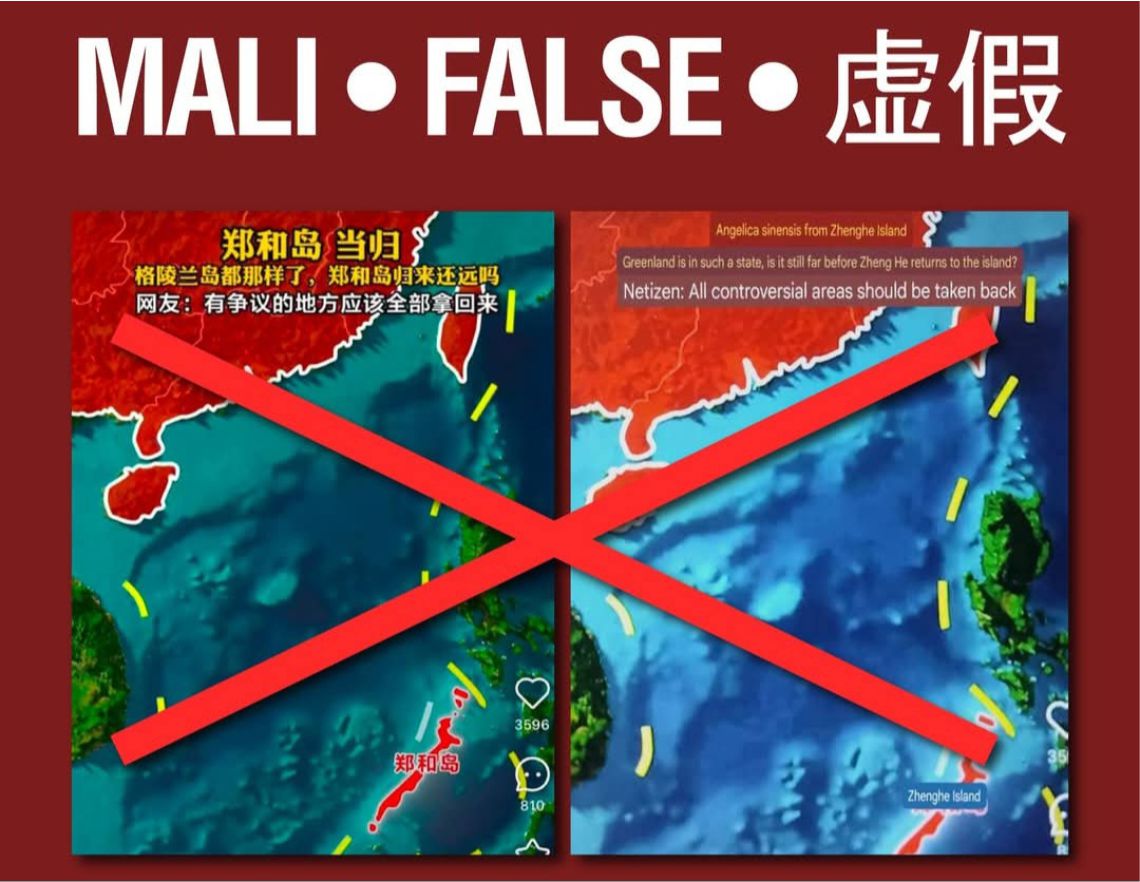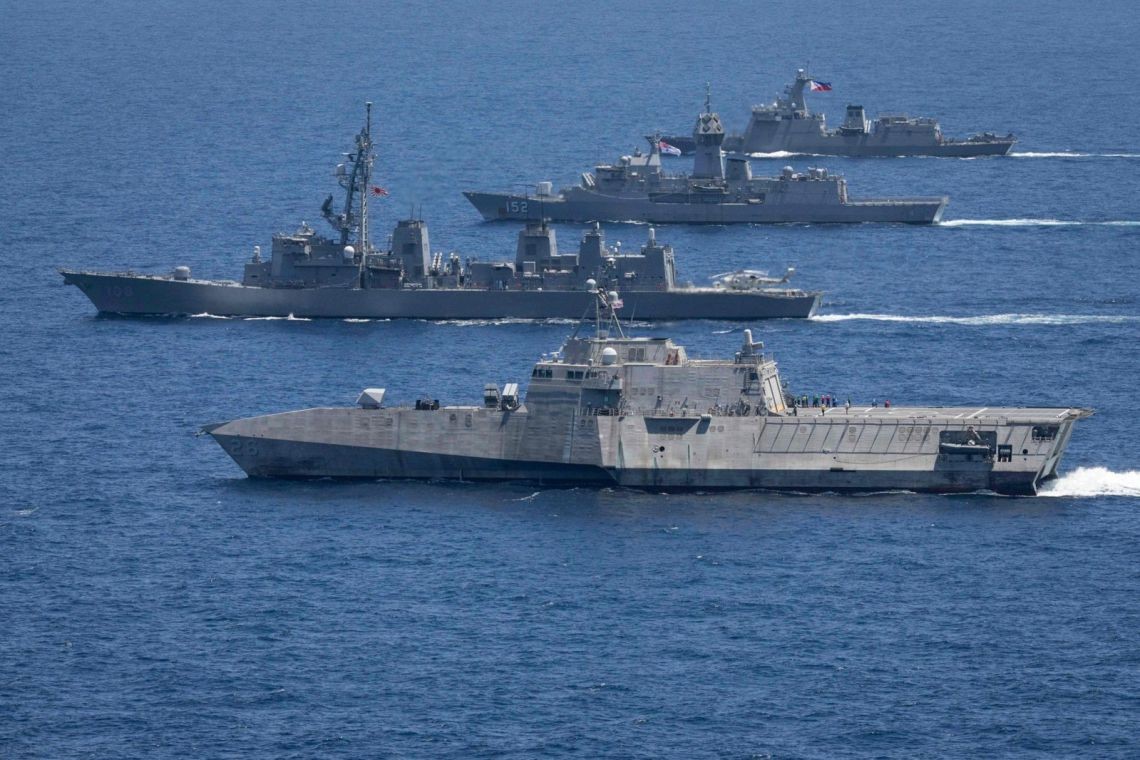Warships from the Philippines, US, Japan, and Australia take part in military exercises on April 7, 2024. Image Source: Australian Department of Defense.
The Mindanao Sulu Unification Movement's (MSUM) recent diplomatic overtures toward China raise serious concerns about their judgment and the risks they pose to the Sulu populace.
By appealing to an antiquated 1405 agreement, the MSUM is relying on questionable and inconsistent historical claims—an approach that mirrors China's own dubious territorial assertions. However, history is not a legitimate foundation for modern sovereignty, and China’s engagement in such tactics is solely to advance its own territorial ambitions, not to support the Sultanate of Sulu’s cause. Rather than gaining an ally, the MSUM risks aligning itself with a nation that has demonstrated time and again that it prioritizes its expansionist agenda above all else.
China's Aggressive Territorial Expansion
China’s reliance on historical narratives to justify its territorial claims in the South China Sea has exacerbated tensions with neighboring nations, particularly the Philippines. Recent confrontations, such as the Second Thomas Shoal Incident (June 2024), the Sabina Shoal Ramming Incidents (August 2024), and the Airspace Confrontations (2025), highlight the two states’ ongoing friction. In addition to these incidents, China has also attempted to revise history to support its territorial ambitions, falsely claiming that the Philippine island of Palawan was under its governance for a thousand years and should be returned.

A social media post by the The National Historical Commission of the Philippines (NHCP) rejects the Chinese claim over Palawan. Source Image: The National Historical Commission of the Philippines’ Facebook page, February 28, 2025.
The National Historical Commission of the Philippines (NHCP) has firmly rejected these assertions, calling them "baseless historical fiction" in an official statement on February 28, 2025. The NHCP emphasized that historical exploration does not equate to sovereign ownership. Furthermore, internationally recognized treaties, such as the 1898 Treaty of Paris and the 1900 Treaty of Washington, reinforce Palawan’s place within the Philippine archipelago. The NHCP declared, "Palawan is and will always be Filipino." It further emphasized, "The NHCP stands by the policy of the rest of the Philippine Government that not one inch of Filipino sovereign territory is for sale, nor can any be claimed by states that purport to be our friends yet continue to undermine regional stability through the reprehensible use of questionable historical data." China’s manipulation of historical narratives to justify its territorial ambitions parallels the MSUM’s reliance on obsolete agreements. Both have faced rejection by the international community, as seen in the PCA ruling in The Hague against China’s Nine-Dash Line and the failed arbitration attempts of the Sulu heirs. These cases illustrate that historical claims, when disconnected from modern governance and legal recognition, lack legitimacy and enforceability.
Historical claims, when disconnected from modern governance and legal recognition, lack legitimacy and enforceability.
The MSUM's Dangerous Assumptions
By seeking China’s recognition based on the 1405 China-Sulu Agreement, the MSUM is falling into the same trap of historical revisionism that China itself employs. However, China’s actions in the South China Sea make it abundantly clear that it is not in the business of supporting weaker allies—it is in the business of territorial expansion. China’s aggressive enforcement of its maritime claims, despite the 2016 ruling by the Permanent Court of Arbitration (PCA) rejecting its Nine-Dash Line under UNCLOS, shows that its interest in historical treaties is purely opportunistic. Similarly, the Sulu heirs' arbitration attempts have also failed, exposing the international community's rejection of these defunct claims. The MSUM’s appeal to China is thus not only naïve but actively detrimental to Sulu’s autonomy, as it risks handing China an excuse to exert influence over the region.
Rather than securing Sulu’s sovereignty, MSUM’s engagement with China could backfire, leading to increased Chinese interference. The Philippine government, through the NHCP and other national agencies, has already taken a firm stand against China’s historical distortions, reinforcing that modern sovereignty cannot and should not be dictated by centuries-old agreements. If China does not respect international rulings and the sovereignty of existing states, there is no reason for it to respect an autonomous Sulu region.
Regional Reactions to China
China has repeatedly dismissed international rulings and treaties when they conflict with its expansionist goals, using historical narratives to justify its control over strategic territories. By aligning itself with China, the MSUM risks legitimizing a regime that has already disregarded the sovereignty of multiple Southeast Asian nations. In response to China’s increasing militarization, Taiwan, the Philippines, and Australia have bolstered their defense cooperation. A military researcher recently urged Taiwan to strengthen coordination with these nations to defend the southern flank of the first island chain, an area that is increasingly under pressure from Chinese military maneuvers.
To reinforce military deterrence against China, regional powers have ramped up joint exercises and strategic cooperation. The Philippines has expanded its Enhanced Defense Cooperation Agreement (EDCA) with the United States, allowing greater U.S. military presence in key locations, including Palawan—directly countering China’s territorial ambitions as well as the Sulu Sultan’s leadership ambitions. Australia and Japan have also increased defense collaborations with the Philippines, conducting joint naval drills and intelligence-sharing initiatives to strengthen maritime security.
In direct response to China’s regional ambitions, the Philippines, alongside the United States and four other nations, launched the "Sama Sama" joint naval exercises near Luzon Island. This military cooperation highlights that the regional strategy is one of deterrence, not accommodation. Taiwan has similarly intensified its joint military training with the U.S. and allied nations, focusing on countering China's aggressive military posturing. The Quadrilateral Security Dialogue (QUAD), consisting of the United States, Japan, India, and Australia, has further expanded its regional presence, supporting smaller nations facing Chinese pressure.
These coordinated efforts illustrate a growing consensus that military deterrence is necessary to counterbalance its expansionism. The MSUM’s approach—aligning with China while others seek to counterbalance its influence—puts it at odds with the broader regional effort to maintain security and sovereignty.
A Strategic Miscalculation
The MSUM’s reliance on a long-defunct treaty with China is not just ill-advised—it undermines Sulu’s autonomy and weakens its standing in regional diplomacy. China’s engagement in the South China Sea has repeatedly shown that it does not act in the interest of smaller nations but instead seeks to exploit them for its own strategic advantage. By appealing to China, the MSUM risks undermining Sulu’s autonomy and aligning itself with a regime that prioritizes expansion over cooperation.
If history has shown anything, it is that China’s territorial claims are self-serving and manipulative. The MSUM should take note. Instead of looking to historically irrelevant agreements, the Sulu leadership must focus on engaging with modern diplomatic mechanisms that prioritize realpolitik over historical fiction.
REFERENCES
Everington, K. (2025, March 3). Taiwan, Philippines, and Australia urged to counter growing Chinese aggression. Taiwan News. https://www.taiwannews.com.tw/news/6049668
KnowSulu. (2025, February 6). Debunking the 1405 China-Sulu Agreement. https://knowsulu.ph/sulu-history/debunking-the-1405-china-sulu-agreement
Marcos H. and Mordeno C. (2025). NHCP hits China claims on Palawan Island. Mindanews. https://mindanews.com/top-stories/2025/03/nhcp-hits-china-claims-on-palawan-island/
National Historical Commission of the Philippines. (2025, February 28). Statement on the Chinese claims on Palawan. https://bit.ly/NHCP-Statement-Chinese-Claims-Palawan
Reuters. (2024). Philippines launches naval drills with allies as regional tensions simmer. https://www.reuters.com/world/asia-pacific/philippines-launches-naval-drills-with-allies-regional-tensions-simmer-2024-10-07/
Echiminada, P. (2025, January 21). MSUM to invoke ancient China-Sulu treaty for UN recognition. Daily Tribune. https://tribune.net.ph/2025/01/20/msum-to-invoke-ancient-china-sulu-treaty-for-un-recognition



